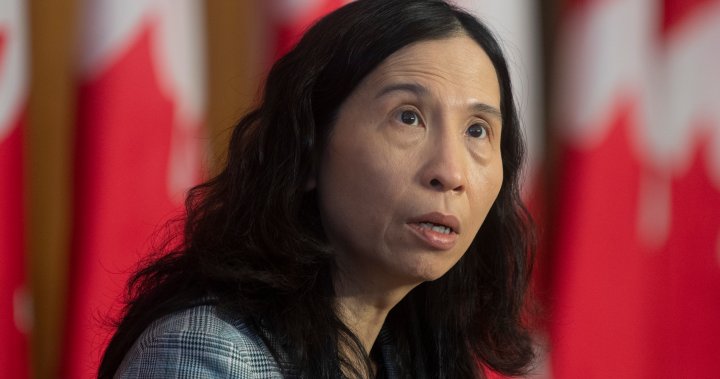Health officials say Canada is heading in the right direction despite rising COVID-19 cases and some bumps in reopening plans.
On Wednesday, Canada added 2,576 COVID-19 cases and 33 deaths.
That marks an increase of seven per cent in the rolling seven-day average of cases in the country compared to a week earlier, according to Canada’s chief public health officer, Dr. Theresa Tam.
Tam said that though cases are on the rise, hospitalizations and ICU levels are still going down — six and 12 per cent, respectively.
The rise in cases has put a kink in Ontario’s reopening plans, though. On Wednesday, the province said it is pausing its plan to raise capacity limits at higher-risk settings, including food and drink establishments with dance facilities (like nightclubs), wedding receptions in event spaces where there is dancing, strip clubs, sex clubs, and bathhouses.
The plan was to raise capacity at these locations on Monday, but instead, a 28-day review period will commence at that time before any changes are made.
Read more:
Ontario pauses further lifting of capacity limits as COVID-19 cases rise
Nevertheless, chief medical officer Dr. Kieran Moore is still happy with the direction the province is headed in and doesn’t foresee more restrictions being reimposed, at least provincially.
“At a provincial level, I honestly don’t see us stepping backwards. It’s always been my advice to government that if we have to, we’ll pause, but we won’t take steps backwards,” Moore said.
The province said the move was out of an “abundance of caution.”
“An increase in cases was always expected as more people move indoors due to the colder weather and as the province eased measures,” a news release said.
Ontario reported 454 new COVID-19 cases on Wednesday, a daily count higher than the same weekday of the previous two weeks, which were at 378 and 321.

The death toll in the province rose to 9,912 as nine more deaths were recorded.
Out of those eligible for the vaccine, 85.1 per cent are fully immunized, while first dose coverage stands at 88.5 per cent.
One province west, Manitoba was also pressed to change its plans given rising COVID-19 cases. The province announced on Wednesday stricter health orders are on the way, but details were scarce.
Read more:
Manitoba’s top doctor says new restrictions coming as COVID 19 numbers rise
“We do have a number of restrictions in place. We see numbers rising despite that, so more is going to be required,” said chief public health officer, Dr. Brent Roussin.
He hinted that the restrictions could include more capacity limits, limits to gatherings and more venues requiring proof of vaccination as possibilities.
“We’re left again at this place where, if the trajectory stays where we think it will, we’re set with overwhelming the health-care system.”
Manitoba added 143 new cases and two additional COVID-19 deaths on Wednesday as the province holds the second-highest rate of infection, behind Saskatchewan.

Manitoba also announced Wednesday that anyone over 18 is now eligible for a third vaccine dose but most must wait a minimum of six months after their second dose. The decision came a day after Health Canada authorized booster shots for all adults.
In Saskatchewan, the COVID-19 death toll grew by four to 878 on Wednesday as 121 new infections were added.
Of the new cases, the provincial government said 86 were unvaccinated, which included 47 children under the age of 12.
Read more:
COVID-19: Saskatchewan adds 4 deaths, 121 new infections
Hospitals in the province are currently providing care for 187 patients with COVID-19: 135 are receiving inpatient care and 52 are in ICUs. As of Wednesday, 63.1 per cent of the hospitalized patients were not fully vaccinated.
There are 14 Saskatchewan residents in out-of-province ICUs, according to officials.
Alberta Health added 484 new COVID-19 cases on Wednesday and five additional COVID-related deaths, while B.C. added 555 new cases and 11 deaths.
There are 404 people in hospital in B.C. and 117 of those are in intensive care. Of those in hospital, 65 per cent were unvaccinated and nearly 30 per cent were fully vaccinated between Oct. 26 and Nov. 8.

Quebec reported 672 new COVID-19 cases on Wednesday and one additional death, while New Brunswick added 69 new cases, of which 39 are unvaccinated and 30 are fully vaccinated. Nova Scotia announced 30 new cases and Newfoundland and Labrador added seven.
The Yukon reported 21 new cases on Wednesday amid a surge of COVID-19 in the territory that has prompted tighter restrictions. The territory declared a state of emergency on Monday and has limited gatherings until Dec. 3.
Read more:
Yukon reimposes state of emergency, announces vaccine rules as COVID-19 spikes again
Acting chief medical officer, Dr. Catherine Elliott, said Whitehorse is experiencing widespread, untraceable COVID-19 cases and an increase in infections among the fully vaccinated given the high amounts of circulation of the virus and the length of time since people had their second vaccine dose.
Elliott says it is normal for vaccine immunity to decrease over time, which is why the government is now offering booster shots to people 50 years and older and will be monitoring other provinces’ moves before potentially expanding eligibility.
— with files from Global News’ Ryan Rocca, Gabby Rodrigues, Annabelle Olivier, Shane Gibson, Thomas Piller, Taz Dhaliwal, Dean Bennett, Alex Cooke, Aya Al-Hakim, and the Canadian Press
View link »
© 2021 Global News, a division of Corus Entertainment Inc.














































